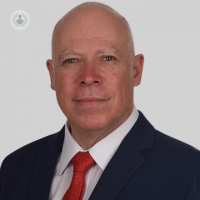Medical cannabis in pain management and rehabilitative medicine
Written by:In recent years, the use of cannabis and cannabis extracts in medical settings has expanded, providing an alternative form of therapy for patients managing a variety of symptoms and conditions. In this informative guide, revered consultant in rehabilitation medicine Dr Andrew Bradford sheds light on the use of medical cannabis in his field, and discusses safety concerns and suitability factors for patients who could benefit from treatment of this type.

How has the use of cannabis evolved in pain management and rehabilitative medicine?
In the UK, medical cannabis can be prescribed by specialist doctors for certain conditions, but access remains largely limited to the private sector.
Prescribing medical cannabis is tightly regulated, and only a small number of physicians in the UK have the relevant expertise. Patients must meet certain criteria, usually when other treatments have failed or are deemed unsuitable. Medical cannabis which includes THC is only available on prescription and involves a peer review process. Cannabis compounds, such as cannabidiol (CBD) and THC, have shown promise in alleviating pain and inflammation, making them relevant in pain management and recovery.
What types of health conditions have shown the most promise in responding positively to medical cannabis treatment?
Specific conditions such as certain childhood epilepsies, spasticity in multiple sclerosis, and chemotherapy-induced nausea have shown the most promise in responding positively to medical cannabis treatment in the UK and these treatments are supported by NICE, the National Institute for Health and Care Excellence. However medical cannabis has been used to treat a wide variety of conditions including chronic pain, spasticity, insomnia, tics, seizures, restless legs and mental health disorders including anxiety and PTSD.
How safe is medical cannabis? What factors could make a person unsuitable for this type of treatment?
While medical cannabis is generally considered safe, it is not suitable for everyone. Factors that could make a person unsuitable for this treatment include pregnancy, a history of substance abuse, certain mental health conditions and cardiovascular disease, and potential interactions with other medications. Patients are carefully assessed by prescribing doctors to ensure safety.
Is medical cannabis typically used as an alternative or as a complement to traditional forms of treatment in your field?
Medical cannabis is typically used to treat symptoms when conventional therapies have proven ineffective or have unacceptable side effects. Medical cannabis can be helpful for some patients, but this is determined on a case-by-case basis, and it may not replace traditional treatments entirely.
What types of results and outcomes can be achieved through treatment with cannabis?
The outcomes of medical cannabis treatment can vary depending on the condition and the individual. Some patients report reduced pain, improved sleep, and enhanced quality of life. However, specific results and outcomes depend on the patient's condition, the prescribed cannabis product, and their response to the treatment.
If you would like to schedule a consultation with Dr Bradford, visit his Top Doctors profile today.


